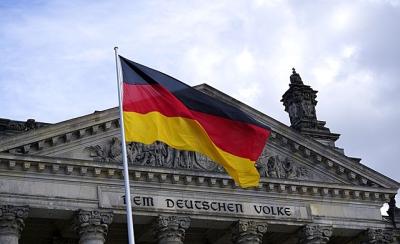Germany must be doing very well. At least, that is how it seems when you look at the laws being dealt with by the “Ampel” (“traffic light”) coalition between Social Democrats, Greens and Liberals after the summer break. Cannabis legalisation, for example, or a ban on unhealthy food. The Self-Determination Act, which allows every German to change his or her gender at will without much effort, also belongs in the line-up. And as if to reinforce Olaf Scholz's point: in the summer interview, the Chancellor played the role of a man presiding over a humming European economic engine, just waiting for a new economic miracle.
The reality, however, looks different. Germany is one of the worst performers in Europe. The German state has decreed itself not to take on any more new debts. However, it bypasses this limitation by working in the Bundestag with "special funds" (“Sondervermögen) that allow it to spend billions which it is not actually allowed to spend. Despite the economic downturn, citizens are threatened with new taxes and hidden levies, for example through a reform of the heating law or the CO2 tax. Meanwhile, the president of the employers' associations warns openly: the longer politicians delay coping with the crisis, the harder it will hit Germany as a business location and the greater loss of prosperity will follow.
The gap between German policy and German reality is thus visibly widening. It would be wrong to attribute the current situation solely to the current "traffic light" government. In 16 years of Angela Merkel's chancellorship, the revenues bubbled up, but they mostly flowed into castles in the sky instead of being used to tackle real reforms. The Merkel era was a phase of lost years in which Germany failed to prepare for the future. Now it's up to the “Ampel” - which, in its left-liberal direction, is mainly thinking about how to spend the money differently but on their own projects. Here we can only mention in passing that Germany is also facing a crisis of unprecedented proportions in the health care sector, in nursing care, in health insurance and in the social system in general – and the depth of this crisis will only be intensified by the citizen's income mechanism, which is eating new holes in the national budget. The fact that the CDU/CSU in opposition hardly benefits from this also means that many voters have understood that the Union is partly responsible for the current situation.
With regard to illegal immigration, Germany is also suppressing the current situation. Something similar can be observed in foreign policy, and even more so in the energy sector. As in the 1990s, the continent's leading economic power is threatening to degenerate into the sick man of Europe. The fact that the “Ampel” is trying to treat the seriousness of the situation with ideological feel-good packaging shows that the government is either unaware of the situation - or needs diversionary manoeuvres. One example is the “heat protection plan” of Health Minister Karl Lauterbach, proposed while so many clinics are dying in parts of the country. In the European Union, Germany has long appeared paralysed, similar to its French neighbour, which is struggling with an ungovernable parliament. Only Italy under Prime Minister Giorgia Meloni has a freedom of movement that enables her to be fawned over by the Brussels administration and Brussels parliamentary representatives like hardly any other head of government. The Federal Republic, on the other hand, lags behind, does not take any initiatives, but laboriously follows events.
A similar phenomenon can be seen in the management of the problems in the housing sector. To put it simply: not enough homes are being built in Germany. In this context, a depressing video has gone viral: people line up along a row of streets - to view flats. This brings back memories of the shortage economy of the GDR. Around 700,000 flats are lacking in Germany, which has led to a rent hike in the country. Minister of Construction Klara Geywitz’s own party, the SPD, has a paradoxical idea here too: they want to freeze the existing rental contracts. For three years, a maximum 6 per cent increase in rents is only to be allowed. In view of the rising construction costs, the incentives for companies to build new flats are will thus be rather low. Incidentally, in Berlin, where the scene mentioned at the beginning took place, the SPD pushed through the "rent cap" (“Mietendeckel”) a few years ago.
But it is not only the federal policy that threatens to fall to Olaf Scholz's feet if the problems continue to add up every day. For the chancellor also has a personal crisis to deal with that has been haunting him since he took office. Scholz has been embroiled in a financial scandal for years, though the extent of his actual involvement is unclear. Specifically, it concerns a billion-dollar tax fraud by Warburg Bank via Cum-Ex transactions. At the time of the fraud, Scholz was the mayor of the Hanseatic city of Hamburg. The city could have claimed back billions from the Warburg Bank. Yet these reclaims - after all, misappropriated tax money - were not actually reclaimed. Scholz was in contact with Warburg's leading figures at the time and there were talks, but Scholz “cannot recall” their content. The case involves not only a strange amnesia on the Chancellor’s part, but also a lost appointment calendar and other curiosities that usually only occur in banana republics - including the suspicion that the Chancellor may have lied to a committee of enquiry. All this has been substantiated since the end of August. In Germany, by the way, there is a term for this unique melange of ideological destructiveness, concentrated incompetence and corruption. It is: "Best Germany ever".
Read also
Journalists on state payroll
For example, the federal government has spent almost 1.5 million euros on commissions to journalists over the last five years – whereby a significantly higher part was spent on public service journalists.
Marco Gallina
The Catholic Church in Germany is in a worse situation than in 1517
The Archbishop of Cologne is one of the most important representatives of the Catholic clergy not only in Germany, but worldwide.
Marco Gallina
The New Wave of German Emigration
This wake-up call dates back to the 2000s. However, the problem is as topical now as it was then.
Marco Gallina
The German migration policy does not want to grow up - yet
It is not only regarding energy policy that Germany remains in a Peter Pan mode for the time being: several events this month have revealed that Berlin, despite its immense burdens, is reluctant to push through a more pragmatic and far-sighted immigration policy.














Comments (0)